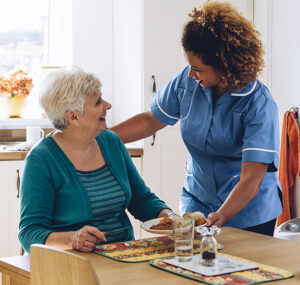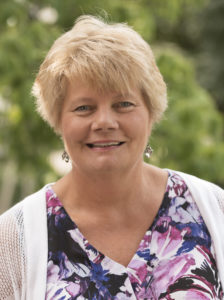When It Is One of Your Own
~ Written by Helen Haddick, Homeland Hospice Nurse
 When my work phone rings early on a day off, I tend to not wake up. When it rings twice, I start to get conscious. By the time it’s the third try and it’s my personal phone, I am wide awake. Before my eyes even opened, I knew it was a phone call I would probably not want to take.
When my work phone rings early on a day off, I tend to not wake up. When it rings twice, I start to get conscious. By the time it’s the third try and it’s my personal phone, I am wide awake. Before my eyes even opened, I knew it was a phone call I would probably not want to take.
It was a dear coworker. Her voice… her muffled cries…. trying and stopping to tell me news that would make my world slow to a screeching halt. A fellow hospice nurse, a friend, a longtime acquaintance had passed. It was like I heard the news but, it really took a moment to register.
It couldn’t be. She was younger than me. She was so spunky and full of life. She was, hands down, the hardest working nurse I had ever met. She has this energy that never seemed to end – except during a few staff meetings when her head would kind of fall. She was loud and infectious…. unorthodox and magical. Her heart… bigger than her personality and unbounded. She can’t be dead. Her kids…. her daughter that she worked so hard for…That just doesn’t die.
I see death everyday. More than most, my coworkers and myself have a deep understanding of how fleeting life is. We see that moment when it is no more… disappearing as if it was never there. We prepare families and patients for it. We share their journeys and feel their emotions. But, this is different. She was one of our own.
I kept thinking about other coworkers. We are a smaller company. We all interact with each other all the time. We bounce ideas, we chat about our adventures … conversations that begin with “I can only ask you guys because I don’t want anyone to think I am dumb …”
My friend … who spent so much time holding the hands of those that were passing. She passed alone … my heart hurts for that reason more than I could ever explain. My only prayer is that it happened so she never knew it was happening.
This pain is almost searing.
Just … how?
I tried to calm my mind a few times today … closing my eyes and trying to just breathe … only to open them with hot heavy tears flowing like rivers down my cheeks. It’s a bad dream, right?
As the day has gone by and I have tried to make sense of it all, I realized that there is no making sense of it. There is a hole in our little company that will never be filled. Her absence will forever remind us of how much her presence meant.
My prayer this evening is simple … that all those she helped … all the hands she held … all the eyes she closed …all the souls she comforted … that they all met her … that they all now comforted her … that they showed her all the love she showed them … that they welcomed her into a place of love, light and peace.
See you on the other side, my dear friend. You will forever be missed.

 Our home tells the story of our lives. It is the place where we find comfort among our memories and personal belongings. We also feel independent and free by living each day according to our own schedule, but with age comes fundamental changes in how to remain at home and thrive. Understanding the challenges and options available to families is essential to safely aging in place.
Our home tells the story of our lives. It is the place where we find comfort among our memories and personal belongings. We also feel independent and free by living each day according to our own schedule, but with age comes fundamental changes in how to remain at home and thrive. Understanding the challenges and options available to families is essential to safely aging in place.

